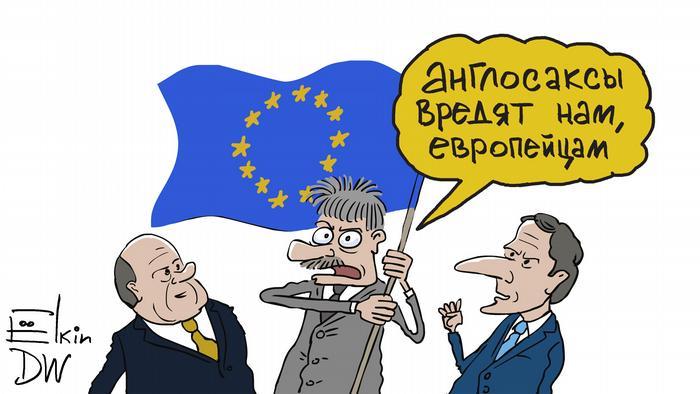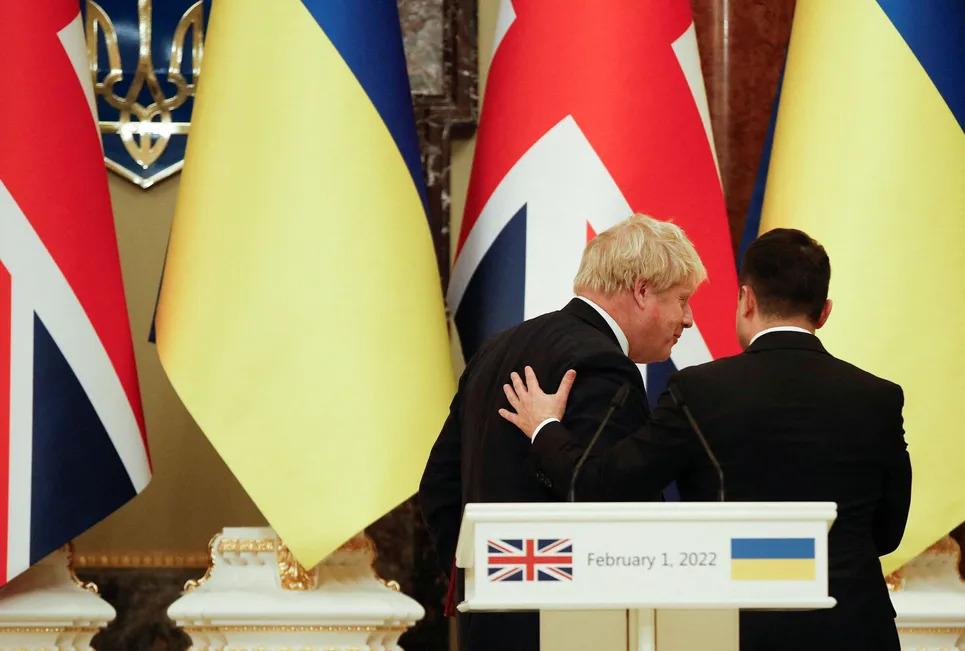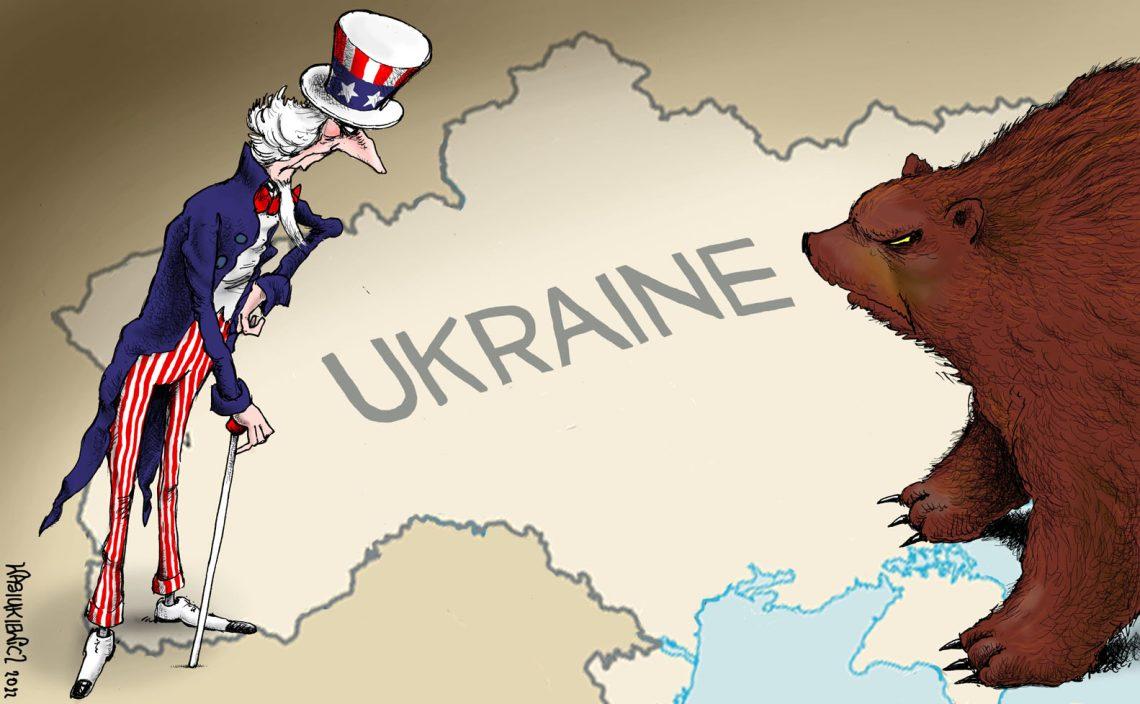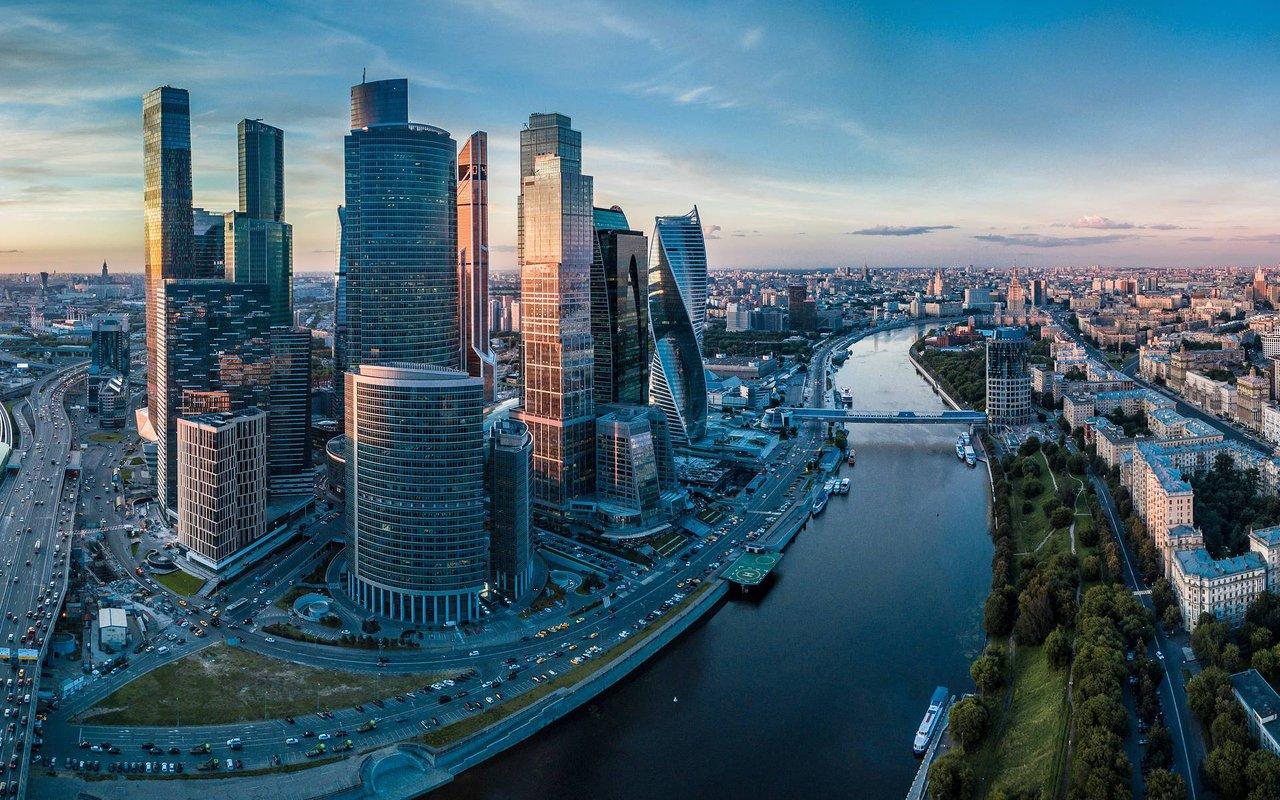Myth comes true: "Anglo-Jewish Golem" haunts Russia "A deadly combination"
As Russia is facing mounting pressure over its invasion of Ukraine, the Kremlin has reinforced its long-cultivated narrative on “the Anglo-Saxons being behind all malicious deeds across the globe”, pointing to the critical American and British role in galvanising the Western response. Given that Moscow’s relations with Israel have also considerably deteriorated over the self-same crisis too, now there is a ground for envisaging a "rarefied new nemesis" – "the semi-fictional Anglo-Jewish alliance".
Myths and reality are inextricably interwoven in the whole saga. The subject represents a whole spectrum riddled with incessantly peddled conspiracy theories, deep-seated enmities and genuine political-cultural discrepancies emanating from differing historic experiences.
What does the term imply?
Without going into detail as to the extent of the term’s historico-ethnic correctness, in the eyes of the Russian state and its powerful propaganda devices, the nomenclature of "Anglo-Saxons" refers to the English-speaking world, the sphere of international Anglophone influence, particularly referring to the US and Britain, with their mighty financial institutions based in the Wall Street and the City of London.
The story dates back centuries. But it was mainly after the Crimean War (1853-56), which ended calamitously for Russia, that Moscow truly developed a sour opinion of Anglo-Saxons. It was Britain, with its sprawling overseas empire, that was the main foe of the age, with the Great Game rivalry over Central Asia being one of the key areas of contention.
Thereafter, the rise of the US as a global force and circumstances leading to the Cold War reshaped the "Anglo-Saxon conglomerate", with London perceived as the old imperial force spreading its menace by diligently advising the new evil, centred in Washington. In this construct, the former British colonies of Australia, Canada and New Zealand were viewed as lesser players, forming the rest of the club.
Ukrainian crisis
In the parlance of top Russian officials, the term assumed heightened importance prior to and during the Ukrainian crisis. Some statements are worthy of consideration to grasp the Kremlin’s meaning.
Before the invasion on February 24, when Russian Foreign Ministry Spokesperson Maria Zakharova was asked about the deployment of troops on the Ukrainian border, she reacted swiftly, fiercely requesting the journalist to mind her own business, adding that she was a representative of the Anglo-Saxon world.
On June 6, Russian Foreign Minister Sergei Lavrov accused Ukraine of “fulfilling the will of the Anglo-Saxon leadership of the Western world”, whereas Presidential Spokesperson Dmitry Peskov blamed the "Anglosaksy" (the Russian version of the term) for “doing nothing, but raising the tensions on the European continent”, stressing that British and American media outlets were “at the top of the list of the aggressors in the information war”.

There are a huge number of other examples of the derogatory use of the "Anglo-Saxons", yet it is perhaps Kremlin Advisor and former KGB officer Nikolay Patrushev’s interview, given to "Argumenti i Fakti", on May 26 that is the best illustration of the concept, as propagated by Russia. In his view, “The Anglo-Saxon style has not changed for centuries, as they keep dictating their conditions to the world, arrogantly ignoring the sovereign rights of countries”.
He also referred to the "golden billion" doctrine, which implies that “the United States and England” form the leading force, with a cabal of bankers in New York and London driving the process which ultimately serves the interests of a select few who believe their birthright renders them as being entitled to prosperity, whereas “everybody else is to toil away for their wellbeing”.
This resonates rather well with the tired old Soviet ideology as if a dusted-off old telegraph from the Cold War attic were polished and implemented in 2022. There is no mention of socialism, but it also places Russia as a liberating force of oppressed nations outside the Anglosphere. The old music of the Internationale is clearly audible.
Rationale
The purpose behind the narrative is, of course, deeply strategic. The aim is to split the Western world over its resolve on Ukraine by emphasising the excessively disproportionate influence levied by the US and Britain on NATO and other Western institutions and to prove it is not in Europe’s best interests to pursue the decisive line of defeating Putin.
The Kremlin knows that, for all its presumed unity, the EU is a bloc comprising nations with deep-seated foreign policy differences. These revealed themselves during the annexation of Crimea in 2014 and, to a lesser extent, during the ongoing war in Ukraine. The emphasis on the Anglo-Saxons is aimed at creating an image of the Continent dancing to the capitalist tune of London and Washington, at the expense of its own vital priorities.
When exiting British Prime Boris Johnson, the most effective and influential Western leader standing up to Russia over Ukraine was compelled to resign, due to an internal Tory rebellion, the Russian mass media did not just refuse to hide its pleasure, but went into a full-scale paroxysm of jubilation.

Volodymyr Pastukhov from University College London (UCL) believes that the Kremlin needs an enemy, and the Anglo-Saxons are a mythical category: “The less real the Anglo-Saxons are, the more convenient they are as the natural enemy. The main supporters of the Anglo-Saxons are now Ukrainians, but this is a purely functional decision, and anyone can be in the Ukrainians’ place.”
Neil Watson, an expert on the post-Soviet world and long-term Putin observer, continued: "This enmity has an Orwellian slant. The so-called 'Anglo-Saxons' are an existential threat and scapegoat for the woes of the world. Putin is a manipulative and pragmatic politician. By creating a race of gum-chewing, burger-eating, beer-swilling Anglo-Saxon capitalist oppressors, he is able to transmogrify his attempted annexation of a neighbouring country into an extension of the class struggle."
The concept he is attempting to import into European minds is that, had it not been for London and Washington’s toxic influence, an EU led by Berlin and Paris would have been better off, with no disruption of gas supplies and no counter-productive sanctions. Medvedev wrote on social network platforms that he pitied "brainwashed" Europeans for “pumping weapons into Ukraine at the expense of taxpayers, leading to a rise in the cost of their lives”.
Another reason substantiating the focus on the mythical enemy is connected with the desire to consolidate Moscow’s own envisioned “Russian world" as a stack and egalitarian contrast to the corrupt and diabolical standard-bearers of the Collective West.
The 'cancel' culture, focusing on the so-called inborn and systemic racism of the West’s foundations that gained momentum in the Anglosphere, is being utilised by Kremlin ideologists in two different ways. Russia is presented as an "inclusive cultural space’" contingent on bringing different ethnolinguistic groups together, without subjugation or any form of colonisation. It also appeals to the sentiments of those Westerners who feel endangered by globalisation and the sense of losing their identity.
Israeli complications
In addition to failing in its attempt to split the West by demonising the Anglo-Saxons, Russia’s relations with Israel have also gone seriously awry. For the preponderant part of the post-Soviet age, Tel-Aviv and Moscow, despite all their differences, have largely managed to maintain amicable relations and tried not to cross their respective red lines.
The present juncture, however, is riddled with complexities that are mainly centred upon Israeli strikes on Iranian targets in Syria, and its willingness to supply billions of dollars of natural gas to Europe via Egyptian liquefaction facilities, as agreed in the Eastern Mediterranean Gas Forum (EMGF) and, overarchingly, Tel Aviv’s continued siding with the West over Ukraine.

All of these pressure points are inextricably interconnected and have Russia's incursion into Ukraine at their heart as the main ingredient in the chain of quarrels. Israeli operations in Syria have been underway for nine years and its desire to supply some energy to Europe is also not new. It is the Ukrainian crisis that has caused the most insoluble issue.
On February 24, then-Israeli Prime Minister Naftali Bennet expressed his support for Kyiv, without condemning Russia, whilst Yair Lapid, a Foreign Minister in his government, called the invasion as “a grave violation of international order”. Many observers opined that the soft tone of the PM and far more bellicose rhetoric of the top diplomat were carefully coordinated to give Tel-Aviv a balancing status as a possible broker between the conflicting sides.
On 5 March, Bennet visited Moscow to mediate between Moscow and Kyiv and achieved nothing. Despite its measured careful attempts not to antagonise the Kremlin, which manifested itself, inter alia, in refusing to join anti-Russian sanctions, Tel Aviv’s overall position does more than tilt towards Ukraine, leading to their schism on a number of fronts.
In April, in addition to supporting the UN General Assembly's condemnation of Russia, the Israeli diplomats voted to suspend Russia from the UN Human Rights Council. The justification presented by Lapin was declared by Russian Foreign Minister Lavrov as “a poorly camouflaged attempt to take the advantage of the situation in Ukraine from the perspective of the Israeli-Palestinian conflict”.
On 19 June, Russia announced that it is drafting an unprecedented resolution for the UN Security Council, condemning the Israeli bombing of Damascus Airport.
There is another substantial addition to the deteriorating relations, which is evidence pointing to the involvement of Israeli citizens fighting on the Ukrainian side. Moscow claims that, during the first four months of the war, 35 Israeli citizens fought against them in a private capacity, out of which nine were killed.
Russia has consequently increased its pro-Palestinian stance. On 10 August, the country's embassy in Cairo officially accused Prime Minister Yair Lapid of hypocrisy for launching an attack on Gaza, whilst simultaneously condemning Russia's military actions in Ukraine.
"Aliyah" disrupted
It is in this context that the Russian Justice Ministry’s request to shut down the Jewish Agency for Israel can be understood. The organisation is older than the modern state of Israel and has been engaged in, amongst other activities, facilitating the emigration of those of Jewish ancestry to the homeland, known in Hebrew as "Aliyah".
The Kremlin insists this is a mere legal dispute arising from allegations that the charity violated Russian legislation during the data-collection process. Tel-Aviv is careful not to exacerbate tensions, with the country’s President Isaac Herzog wisely promulgating “some things are better left unsaid” in late July. The next court hearing in Moscow has scheduled for 19 August and Israeli expectations are far from optimistic.
The war in Ukraine has not just prompted a surge of refugees fleeing the war zone, but also sparked an emigration of Jews from Russia. The Times of Israel reports that nearly six months since the start of the war, around 16,000 Russian Jews left Russia.
On top of all these, Moscow’s Chief Rabbi Pinchas Goldschmidt left Russia on 7 June, citing his comments on the invasion of Ukraine as being responsible for the excessive pressure mounted on himself.
The cumulative impact of the recent developments points rather irresistibly to one conclusion: this is the lowest ebb of Russian-Israeli relations since the collapse of the Soviet Union.
The true state of affairs
Russian propaganda may trail a blaze in certain quarters of the globe and some circles in Western countries, yet it would be fair to say the world at large is far from succumbing to it.
The truth is that the Special Relationship forged by Britain and the US after the Second World War has been one of the cornerstones exerting a huge influence on global affairs. It is also true that the 19th century was defined by “Pax Britannica", as Britain used to rule the waves, and for a substantial part of the 20th century, it was the US that was the dominant international force.
There is no point in denying that the emergence of the modern state of Israel, considering its pre-creation phase and foundation, was actively assisted by both London and Washington. Of course, there are certain interests uniting these actors, giving a considerable degree of uniformity to their respective foreign policies.
As to the purported competition between these two worlds, rhetoric and linguistic originality can take one up to a superficial point. Where do these two opposing centres stand? Russia, for all its geopolitical significance and past achievements, lags behind rather obviously. From education to advanced scientific research, it often mimics Western achievements, albeit in a less efficient guise. For instance, the Russell Group and Ivy League universities of Britain and the US dominate world education, with Russian institutions not contributing in any significant way.
Fundamentally speaking, Russia is struggling to come up with anything globally competitive in high technology. The war over Karabakh was a triumph for Azerbaijan, armed with the crème de la crème of Turkish and Israeli weaponry, defeating Armenia, which was reliant on outmoded Russian arms supplies. The Kremlin military machine, for all its supreme capabilities over Ukrainian forces, has so far failed to impress technologically. These all are indicative of not being up to scratch and failing to compete on equal terms with the West.
When it comes to the emulation of Western institutions, Moscow’s financial district is a case in point. This Herculean undertaking on a bank of the Moscow River was envisioned as Russia’s answer to Manhattan and the City of London. It may have 12 billion worth of skyscrapers but, upon closer examination, it transpires to be a collection of largely unused or repurposed buildings housing no critical mass of financial operations that would render it a viable global centre. Building a lot of skyscrapers in one spot does not make a financial cockpit. As Neil Watson has observed keenly, “a poor simulacrum of the West does a huge disservice to Russia''.

A foreign policy design is successful when it creates a critical mass of supportive nations, enabling a given country to exercise greater leverage. If Russia’s genuine aim was to peddle the idea of mythical Anglo-Saxons causing all imaginable devilish plots across the globe, drawing a wedge between the Anglo-American bloc and the rest of the Western world, that has manifestly failed. Instead, the real-life ingredients of this alliance managed to impact Europe’s response in such a way that Russia has found excessively daunting.
Now, Israel has joined the club. Another actor from the old fiction has made its way to the scene, making its stance on Ukraine increasingly clear. The old myth, with its origins in the Tsarist age, regarding the Anglo-Jewish alliance has become somewhat real, acquiring a discernible shape in the confederation of forces with which Russia has found itself entangled. Neil Watson appositely stated: "Russia has created its own international Golem."
In practical terms, this is what one may tentatively call a "deadly combination", with the capacity to haunt the beleaguered policy-makers in the Kremlin for the foreseeable future.
Now, Russia has ground to a juddering halt and this is not a time for a flamingly defiant oration to prove otherwise. What needs to be done is to dispose of the tired past in the dustbin of history and embrace an entirely new future wherein there is no place for mythical enemies or contrived perceived threats, but for progress and sensible relations with nations across the globe, as such a great nation as Russia deserves much better than this.








